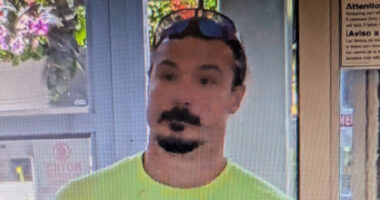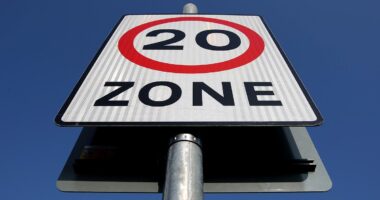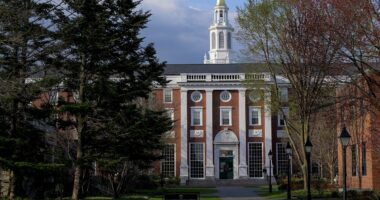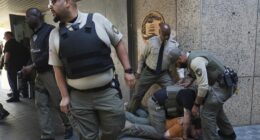They are still confused and, understandably, a little angry in the centre of Essen, though the mood is very much calmer than it was a few days ago.
Back then, many people were scared witless, grabbing their children and running for the exits. As I stand here, amid the oom-pah music, the fairy lights and the little stalls selling hot chocolate, hefty sausages, toys, candles and all the ephemera you would expect at a traditional German Christmas market, I can see why.
For in mid-afternoon on Sunday December 8, this snug ambiance – what the Germans like to call ‘Gemütlichkeit’ – was suddenly disrupted by chants of ‘Allahu Akbar’.
Out of nowhere came a large, boisterous crowd – mostly Arabic, almost entirely young men – who barged past the fairground rides and on down the narrow pathways between the market traders with their jewellery displays, gingerbread houses and puppet shows.
On and on they came for more than an hour, chanting unfamiliar slogans and waving flags and banners. Reports say that there were upwards of 10,000 marchers.
Though the event turned out to be entirely peaceful, it was woefully ill-judged.
Germans have not forgotten that it was at a Christmas market in Berlin where a failed asylum-seeker from Tunisia drove a stolen truck into the crowds in 2016. He left 13 dead and 56 injured.
And just tonight, reports are coming in of another ‘terror’ Christmas market attack.
A car crashed through barriers protecting the market in Magdeburg and drove straight into shoppers, eyewitnesses reported.
Video purportedly taken by a nearby camera showed a car mowing down pedestrians as it sped through a narrow alleyway with stalls on either side.
The driver has been arrested, Germany’s DPA news agency reported, and police closed the market as they searched for explosives.
In the Essen area, memories are especially raw of what happened just up the road in Solingen less than four months ago. The town was celebrating a late-summer ‘festival of diversity’ when a 26-year-old Syrian man – already in breach of a deportation order having lost his asylum appeal – went berserk with a knife.

It was in Essen’s Christmas market, much like this one in Cologne visited by Robert, where the friendly ambience was suddenly disrupted by Syrian migrants chanting ‘Allahu Akbar’

On and on they came for more than an hour, chanting unfamiliar slogans and waving flags and banners in Stuttgart. Reports say that there were upwards of 5,000 marchers
Three passers-by were killed and five more seriously wounded in the middle of a concert by local celebrity disc jockey, Topic. It later emerged that the police had pleaded with Topic to keep on playing in order to avoid a mass stampede and an even greater loss of life. Both attacks, it transpired, were linked to the terror group Islamic State.
Then, three weeks ago, police thwarted a plot by a 37-year-old Iraqi asylum-seeker to drive a vehicle packed with explosives into a Christmas market in Augsburg. Visit any major square in Germany right now and it’s not hard to spot the giant concrete anti-truck defences, even if they have been disguised in Christmas wrapping.
Hence the acute nervousness, bordering on panic, in Essen, as this vocal crowd took everyone by surprise as they started marching – some say aggressively – through a Christmas market spread over several city squares. Similar scenes were playing out at other Christmas markets, including those in Dresden and Stuttgart. The occasional firework only added to the tension.
The more worldly Christmas shoppers might have recognised what was really going on. Indeed, they might even have joined with applause. For, alongside the now-ubiquitous Palestinian flag, the large majority of flags and banners carried three red stars between a green and a black stripe. These were the colours of the old Syrian republic prior to the murderous Aassad dictatorship.
On the weekend in question, this crooked regime had only just collapsed with ex-President Bashar al-Assad and his family fleeing to Moscow. No wonder all these Syrian refugees, driven from their homeland by Assad, wanted to celebrate the longed-for revolution.
Unfortunately, most Germans do not follow Middle Eastern affairs. Nor do they know their Syrian flags. Furthermore, neither the police nor the organisers had warned them that a demonstration was coming straight through the Christmas market.
‘There must have been very bad planning by the police because we had no idea what was happening,’ says Chiara Piccoli, behind the bar of the pop-up Taverne zum Greifen. One minute, she was pouring out mugs of wassail, a piping hot mix of beer and cider. The next, her customers were running away.
‘This crowd suddenly appeared from near the station. Our guests just put down their drinks and left. It was intimidating.’

Out of nowhere came a large, boisterous crowd who barged down the narrow pathways between the market traders with their jewellery displays, gingerbread houses and puppet shows. Pictured: Hardman at Essen’s Christmas market

Chiara Piccoli, who runs the Christmas taberna in Essen, described the marchers as ‘intimidating’
Firing up his pedal-powered forge for another public demonstration, pony-tailed ‘new hippy’ blacksmith Maik Pabel, 23, tells me that what should have been a bumper Sunday was a disaster.
‘This was my black day at the market. I had no visitors for five hours,’ he says. ‘I had one family booked in for a birthday workshop. They just rang up and said they didn’t want to come. They said: “Sorry but the kids are afraid”,’ says Mr Pabel.
‘We later heard that 300 people had registered for a protest but then 10,000 turned up and chose their own route.’
Some will argue that this was just an overblown case of cultural misunderstanding and that we should all ‘move on’. However, the marchers could hardly have chosen a more unfortunate time or place. For this has only served to inflame the broader debate now driving a wedge through a deeply divided country.
‘We are pleased that Assad’s unjust regime has ended. However, chanting Islamist slogans is completely unacceptable, especially in the atmosphere of a Christmas market,’ Bavarian MP Andrea Lindholz told German newspaper Bild. ‘Anyone who flees to a democratic constitutional state and then glorifies Islamism should leave our country.’
This is not the voice of the extreme Right. Ms Lindholz is a family lawyer who represents the CSU, the Bavarian wing of the party once led by Angela Merkel. As Chancellor, it was Mrs Merkel who opened the borders to more than a million Syrian refugees in 2015, earning her plaudits across the West for her liberalism (Time magazine named her its Person of the Year).
Today, as she tours the country promoting her memoirs and insisting she has no regrets, her old party is turning its back on her. Former Merkel loyalists now see her legacy – dependence on cheap Russian gas, exports to China and US military protection plus open borders for asylum-seekers – as a disaster.
Growth in Germany is now the lowest in the G7 nations (just below Britain) while business confidence is in freefall as companies face the prospect of tariffs from an incoming Trump administration in the US.
With energy prices soaring, Germans have not felt this poor in a generation. That is why scenes like the Christmas market are prompting many Germans to ask whether their generosity has run its course.
For the fall of Assad has not just coincided with Christmas. It has also coincided with the implosion of the German government. On Monday, Chancellor Olaf Scholz lost a no-confidence motion in the German parliament, the Bundestag, and his three-way centre-Left/Green/liberal coalition has collapsed. There will now be a February election in which migration is already a key issue.
No European nation in recent years has taken in more refugees than Germany and a very large number of them – around a million – are Syrians who were fleeing the Assad regime. Up to a third now have jobs and, in many cases, citizenship. An estimated 500,000, however, are living on benefits.
The far-Right AfD party is now arguing that many – if not most – of them should now return home, since the Assad threat has now been expunged.
‘These Syrians were declared to be refugees because they were fleeing from Assad. There should now be no further question. Every Syrian asylum seeker, especially those celebrating the fall of Assad, should go home,’ Beatrix von Storch, the party’s deputy leader, tells me.

Beatrix von Storch, the far-Right AfD party’s deputy leader, says that ‘every Syrian asylum seeker, especially those celebrating the fall of Assad, should go home’
The AfD is currently twice as popular as Mr Scholz’s centre-Left SPD in the opinion polls. Way out in front is the centre-Right CDU which is now adopting a similar stance.
‘Two-thirds of Syrians in Germany are not gainfully employed,’ said CDU leader Friedrich Merz, the man most likely to be Germany’s next Chancellor, this week. ‘Many of them must return to their country to contribute to reconstruction.’
While advocating a deportation policy for some, he has also said that ‘well-integrated Syrians who contribute to society are welcome to stay’.
His party is split over whether to offer financial incentives. ‘I don’t believe that a Syrian who doesn’t intend to leave Germany anyway will do so for 1,000 euros,’ says the CDU’s Serap Guler, the party’s first MP of Turkish origin. ‘We shouldn’t start a bidding war.’
However, Jens Spahn, who served as Angela Merkel’s health minister through the Covid crisis, is advocating a €1,000 return package. ‘Those who are actually integrated, who pay for themselves and their families, who speak the language, are part of our German society, they should get an offer to stay,’ he said. ‘At the same time, those who do not need our protection anymore, they need to leave.’
Many on the centre and Left of German politics argue that Syria is no safer than it was. They also point out that Germany’s health service would be in chaos if the country’s 6,000 Syrian doctors were now to return home.
However, no one, including the AfD, is suggesting that. ‘We would be happy to keep the doctors but, to be fair to Syria, don’t they need those doctors?’ says Beatrix von Storch. ‘And if we are losing a million migrants, with 500,000 of them on benefits, then there would be positive impacts for the economy.’
Migrant support groups point out that Syria is woefully ill-equipped to cope with a sudden influx of repatriations and argue that refugees should be allowed to remain in the West until they have homes and jobs to which they can return.
Similar debates are starting to play out across Europe. In the UK, the Home Office has announced a pause in the processing of asylum applications from Syria. The Austrian government done the same and says it is drawing up ‘a programme of orderly repatriation and deportation’. However, it is in Germany where the issue is of an entirely different magnitude.
And now those once-welcoming European hosts are talking about deportations.
I travel an hour south to the cathedral city of Cologne, adopted home city of archaeologist and art curator, Jabbar Abdullah, 35.

Archaeologist and art curator, Jabbar Abdullah, 35, left Syria in 2014, after police discovered that he was responsible for an outbreak of graffiti against president Assad in his home town of Raqqa
‘I see this as discriminatory,’ he tells me over a beer in his local bar. ‘Of course there is a moral obligation for us to do something for Syria but not to go back. It is an impossible situation for those who have made Germany their homeland. There are children who have grown up here who cannot speak Arabic.’
He was a student when he had to flee Syria in 2014. The police had discovered that he was responsible for an outbreak of graffiti in his home town of Raqqa, where messages such as ‘Assad is a child-murderer’ started popping up.
‘I sprayed one on my own house so they wouldn’t think it was me but they found out,’ he says with a wistful smile. He travelled via Lebanon, Egypt and Turkey to Bulgaria where, after eight months, he secured residency in Germany, becoming a citizen in 2018.
He says he has endured plenty of racism and was even reported to police for ‘planting a bomb’ while working on the restoration of an old city wall. But he believes that if Syria stabilises and Germany, with other Western powers, offers to help with reconstruction then ‘200,000 Syrians will go home in the first year’. If things get worse, however, then he warns of an even greater exodus from Syria.
As for the Christmas market invasion in Essen, he asks for understanding. ‘It was not intended in a bad way. You have people who have only just arrived in Germany and don’t know what Christmas is.
‘The police should not have allowed a demonstration in a Christmas market anyway. I held a demonstration here in Cologne and the police said “it would be nice if you did it away from the Christmas market” and we did.’
Across town, Cologne’s famous Christmas markets – all six of them – are in full swing. At one of the countless glühwein stands, I chat to Steffi, Olga and Englebert who work for a car dealership and all say that the whole point of a Christmas market is to escape politics and the outside world. They cannot imagine why anyone would want to demonstrate in a place like this.
On a cold, clear night, this city looks magical in full festive mode, though here, too, memories linger of the notorious New Year’s Eve celebrations here in the early hours of 2016. More than 500 women reported sexual assaults by roaming gangs of young migrants, most of whom turned out to be North African. The outrage was compounded by initial police attempts to conceal the scale of the crimes and the ethnicity of the attackers.

Robert Hardman visits Fronhof, Solingen, the square in which a Syrian knifeman killed people celebrating at a ‘festival of diversity’ back in August

Astrid Muller, who owns the ‘Weinachtspyramide’ bar in Essen, says people in the market were ‘scared and saying: “What’s happening?”‘
As with the terror attacks elsewhere, such episodes cause just as much anxiety among the millions of entirely peaceful migrants who are currently hoping to build new lives in Germany. They are the ones who will feel the repercussions.
In daylight, I drive to Solingen and walk through Fronhof, the square in which that Syrian knifeman killed those poor souls celebrating ‘diversity’ back in August. Few want to talk about it. ‘We are only just getting back to normal now,’ says Edi Aytemur, manager of a nearby pizzeria.
Outside, a pensioner, who will only give his name as Ludwig, is blunt: ‘There are far too many people here who can’t speak German, can’t speak English and have no qualifications. Yet they get help while old people like us are not looked after. And now, when it’s dark, I don’t go out. I don’t feel safe anymore.’
Back in Essen, all is calm in the Christmas market as I drop in at the popular ‘Weinachtspyramide’ bar in the centre of Willy-Brandt-Platz for an excellent hot chocolate. This was one of the first places to be overrun by the Syrian demonstrators.
‘It was a bad day,’ says owner Astrid Muller. ‘The police were nowhere and then later said “Everything is good”. Well it was not good. People were scared and saying: “What’s happening?”.’
Does she have a message to those celebrating the fall of the hated Assad? It is one I have heard again and again this week and, no doubt, it will be echoed on the election trail in the weeks ahead: ‘Here, take a shovel. Go home and build a new country.’

















